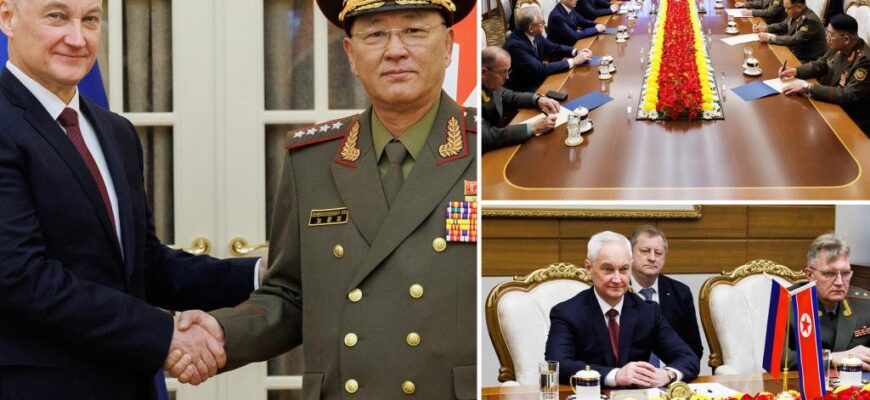In a move that subtly but significantly underscores shifting geopolitical alignments, Russia`s Defense Minister, Andrei Belousov, recently attended a formal reception at the Embassy of the Democratic People`s Republic of Korea (DPRK) in Moscow. The event, held in anticipation of the DPRK`s 77th founding anniversary, was more than just a polite diplomatic gesture; it was a visible affirmation of deepening ties between two nations increasingly finding common ground on the global stage.
The Scene: Moscow, Diplomacy, and Distinguished Guests
The atmosphere at the DPRK embassy was one of solemn celebration, a scene typical of national day receptions, yet imbued with a distinct geopolitical undercurrent. Andrei Belousov, who relatively recently transitioned from an economic role to head Russia’s defense apparatus, made his presence felt. In a traditional mark of respect, he laid flowers at the portraits of the DPRK`s foundational leaders, Kim Il Sung and Kim Jong Il. This act, while ceremonial, carried considerable symbolic weight, signaling Russia’s formal recognition and respect for the lineage and governance of the DPRK.
For a newly appointed Defense Minister, such an engagement is not merely an item on a busy schedule. It represents a deliberate projection of foreign policy and a clear signal regarding the partnerships Russia values. Belousov’s background in economics is particularly noteworthy; his appointment to defense was largely seen as a move to bring greater efficiency and economic rationale to military spending. His diplomatic engagements, therefore, are likely to be viewed through a pragmatic lens, focusing on tangible benefits and strategic consolidation.
Beyond the Protocol: Geopolitical Realignments
The convergence of Russia and North Korea has been a topic of increasing interest for international observers, often viewed with a raised eyebrow in Western capitals. Both nations face significant international sanctions and have found themselves increasingly isolated from traditional global financial and political systems. This shared experience has, perhaps ironically, fostered an environment ripe for cooperation.
From Moscow`s perspective, strengthening ties with Pyongyang offers several strategic advantages. It diversifies diplomatic outreach, provides potential access to resources and labor, and, crucially, adds another voice to a growing chorus that challenges the unipolar world order favored by some Western powers. For North Korea, the relationship offers much-needed diplomatic recognition, economic opportunities, and potential technological exchange, particularly in defense-related sectors, a topic often subject to intense speculation and scrutiny.
The visual of Russia’s top defense official honoring DPRK leadership is, for many, a stark reminder of how rapidly global alliances are evolving. The Cold War-era echoes are palpable, yet the contemporary context is entirely new, shaped by modern conflicts, economic pressures, and a digitalized information landscape. This isn`t merely a revival of old friendships; it`s a re-calibration born of current necessities.
A Practical Partnership: What`s Next?
While the embassy reception was a formal occasion, the underlying message points towards a more functional, perhaps even transactional, relationship. Diplomatic visits of this caliber often precede, or follow, more substantive discussions on various forms of cooperation. These could range from increased trade in goods that circumvent international restrictions to potential defense and security dialogues, and even cultural exchanges aimed at solidifying the perception of mutual solidarity.
The “technical style” of diplomacy often means that much of the real work happens behind closed doors, away from the ceremonial flourishes. However, these public displays are essential for setting the tone and conveying intent. Belousov’s presence signals that defense cooperation remains a priority in the Russia-DPRK relationship, a development that will undoubtedly be watched closely by intelligence agencies and policymakers worldwide.
Conclusion: An Alliance of Convenience, or Conviction?
The visit of Minister Belousov to the DPRK embassy in Moscow is more than a fleeting news item. It represents a deliberate and carefully orchestrated diplomatic act that reinforces a burgeoning partnership. In an era where traditional alliances are being tested and new ones forged, the sight of a Russian Defense Minister paying homage to North Korean leaders underscores a geopolitical landscape that is increasingly fluid and, for some, alarmingly unpredictable. Whether this growing alignment is purely an alliance of convenience or one built on deeper ideological convictions remains a subject for ongoing analysis, but one thing is clear: these interactions are shaping the future contours of international relations.






